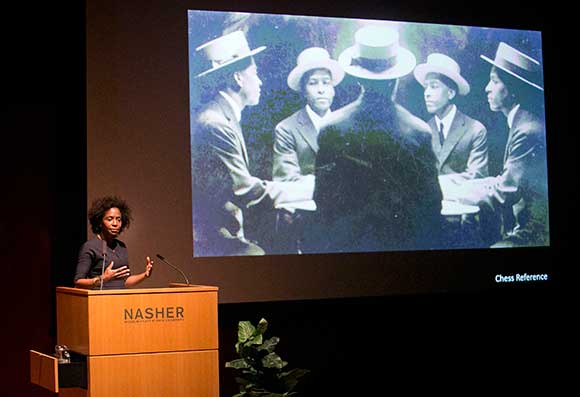Celebrating John Hope Franklin's Legacies
Scholars and activists say they continue to find inspiration in historian's work
At the start of the three-day symposium “Global Slaveries/Impossible Freedoms” celebrating the legacies of John Hope Franklin, Professor Thomas DeFrantz described how the symposium’s title represented the sadness of the contemporary situation.
“We’re here, of course, to address the hope,” DeFrantz said, alluding to Franklin’s middle name.
Organized by Thavolia Glymph, associate professor of history and the John Hope Franklin visiting professor of legal history at Duke Law School, and DeFrantz, chair of the African and African American studies department, the symposium brought hundreds of students and members of the Duke and Durham communities together to affirm that Franklin’s scholarship, teaching and activism continues to inspire.
Harvard University president Drew Faust inaugurated the symposium on Thursday evening with an hour-long lecture on history’s “preeminence as an indispensible agent of change” providing Franklin with a salvation of sorts.
Franklin, she said, “found history a calling and a weapon, a passion and a project.” As a scholar he had “unearthed reams of new facts buried in archives until history decided black lives matter.”

Angela Davis speaks at the John Hope Franklin symposium. Photo by Megan Mendanhall
The symposium continued Friday morning with hundreds attending a keynote by activist Angela Davis, distinguished professor emerita at the University of California, Santa Cruz. In a ranging speech, Davis called for the demilitarization and disarmament of police as well as the eradication of the prison industrial system. “We frame our demands on what we think is achievable rather than what is possible,” she said.
Following Davis’ keynote were three panel sessions: Global Histories; Slavery Racism and Capitalism; and Black Political Thought.
Friday evening attendees watched a performance incorporating dance and technology by SLIPPAGE founder DeFrantz in the atrium of the Nasher Museum of Art. Later, a keynote by visual artist Lorna Simpson who shared her artistic process and many images of her work, some of it dating back to the 1980s. Her piece, “Direct Gaze, 2014” was used in the symposium’s marketing materials.

Materials at the Nasher Museum of Art showcases the continuing influence of John Hope Franklin. Photo by Megan Mendenhall
The final keynote presenter, Saidiya Hartman, a professor of English and comparative literature at Columbia University, read from a “speculative history” work-in-progress. The work, based on police reports, touched on themes of enslavement, labor and sexuality. Her talk preceded the symposium’s final panel on ”Sexuality and the State.”
The symposium was part of a year-long series of events at Duke remembering Franklin’s legacy in the centennial year of his birth.

Documentary artist Lorna Simpson discussed her work "Direct Gaze," based on images of African-Americans. Photo by Megan Mendenhall/Duke University Photography
“This has been a magnificent conclusion to the year. I have never heard a better presentation than the one Drew Faust delivered on Thursday night,” said William Chafe, professor emeritus of history at Duke and co-chair of the Franklin Centenary. In closing the symposium, Chafe said there were three words that came to mind when he thought of Franklin: persistence, discipline, and patience.
“He would never give up his quest to make ours a better, more just world, or to use his scholarship to advance that cause,” Chafe said. “He understood that the struggle to end racism would not end in his lifetime, or in ours – and that only by continuing the struggle, day by day, could hope be sustained.”
The final events of the centenary are later this month. “The Global Scholar,” a talk by John Gartrell, director of the Franklin Research Center at Duke, will be held at noon Wednesday, Nov. 18 at the John Hope Franklin Center. The Sarah P. Duke Gardens will hold “Fall for Orchids,” an annual event that this year will feature the orchid named for Franklin beginning Saturday, Nov. 21.
For more information on the Centenary, visit https://jhf100.duke.edu.